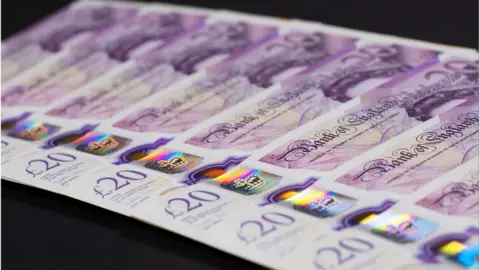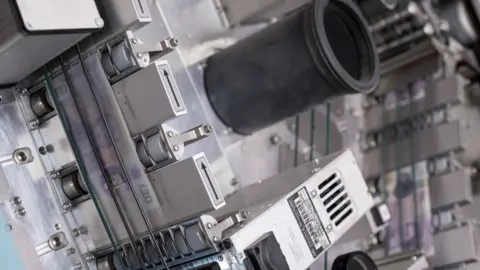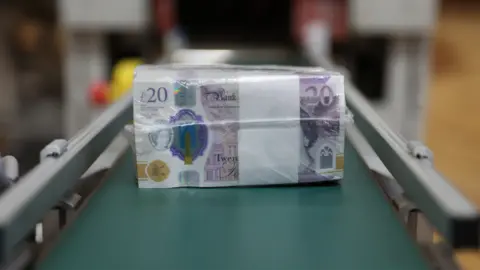Turning billions of £20 notes into compost
 Bank of England
Bank of EnglandSpend £20 today and it could soon be on its journey to becoming compost.
The Bank of England has begun the massive task of destroying £40bn-worth of paper banknotes, which will be replaced by new polymer £20 notes.
Around two billion paper notes will be withdrawn and recycled to be used as a soil improver for agriculture.
"It's an enormous operation the general public will barely notice," said Mark Saunders of G4S, which handles two-thirds of Britain's banknotes.
The replacement of the two billion notes will be the biggest cash replacement in UK history.
The old £20 notes bearing the image of economist Adam Smith are being taken out of circulation. That means notes returned to banks or to cash centres by retailers will not be used again, although some stores recycle notes through their own cash machines.
The process will take months, but once enough have been destroyed the Bank of England will give six months notice for the remaining notes to be handed in.
Last time the £20 was replaced - in 2007 when the Edward Elgar note was withdrawn - it took three years before it stopped being legal tender. It could be quicker this time, but it's likely to be 2021 at the earliest before the Bank sends out its six-month deadline for the paper Adam Smith £20.
What happens to the withdrawn notes?
 G4S
G4SThere's a highly-secure warehouse on a back street in London. There, two huge high-speed note-sorting machines whir through thousands of pounds every minute.
The mini note-sized rollercoasters on the machines can count, authenticate and sort 33 notes per second through a complex array of sensors and fast-moving belts.
They're part of a nationwide network of high-security cash centres - the Note Circulation Scheme (NCS) - run by G4S, NatWest Bank, the Post Office and Vaultex UK.
Last year, the NCS processed £93bn-worth of bank notes.
"The high-speed note sorters will be vital in identifying and sorting out the old notes," said Rob Perry, G4S cash solutions operations and support manager.
"The old £20s will be wrapped in blocks of £50,000," he revealed. "They're tightly-packed, sealed and stored in metal cages in the cash centre's vault."
Up until 1990, the Bank of England used to take all its old notes and burn them in an incinerator to help heat its building in the City of London.
Now, when the £50,000 blocks are returned, the Bank uses a composting treatment, similar to that used in the treatment of food waste, to create a soil improver.
Replacement planning
 Bank of England
Bank of EnglandThe work to replace the old £20 notes began in early 2019, with technicians steadily updating note-sorting machines so they would recognise the new polymer note and simultaneously sift out the old.
The G4S Cash Business then oversaw the delivery of millions in notes to 33 strategically-chosen bank branches to coincide with Thursday's launch date. Across the UK, 38 carefully-selected ATMs were also filled with the new notes by G4S.
As the new £20 notes are 15% smaller than the old notes, tens of thousands of cassettes in ATMs across the country have needed to be replaced or reconfigured.
The planning behind this had been going on for more than a year.
Within two weeks of the launch of the new note, it's expected that every bank branch supplied by G4S will stock new notes.
Within about six to eight weeks, every ATM will have been converted to the new £20 cassettes while the NCS members will stockpile old notes in Cash Centre vaults, ready to be sent to the Bank of England to be destroyed.
"The life of a note is extraordinary," Mark Saunders, director of G4S's Cash Centre Operations, said. "After we've machine-sorted the cotton notes out, they'll be parcelled, weighed and sealed - in cages in our vaults, before being securely transported back to the Bank of England for verification and destruction."
Withdrawing the paper £20 note
The Bank of England said: "You will still be able to use the paper £20 note until we withdraw it from circulation. We will announce the withdrawal date after we have issued our new polymer £20 note. We will give six months' notice of this withdrawal date."
Even after the deadline passes, you will still be able to cash old notes in.
The Bank of England said: "Many banks will accept withdrawn notes as deposits from customers. The Post Office may also accept withdrawn notes as a deposit into any bank account you can access at the Post Office. And, you can always exchange withdrawn notes with us."
